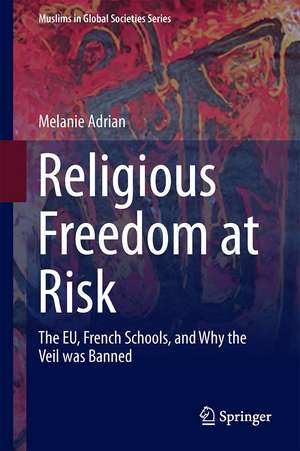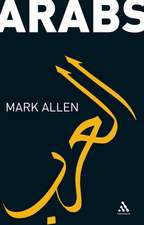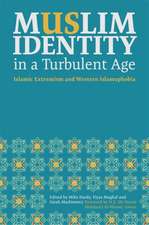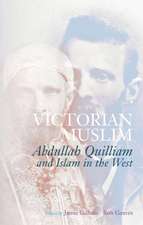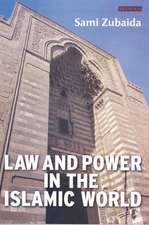Religious Freedom at Risk: The EU, French Schools, and Why the Veil was Banned: Muslims in Global Societies Series, cartea 8
Autor Melanie Adrianen Limba Engleză Hardback – 9 oct 2015
内容紹介
この本はヨーロッパにおける宗教の自由に関する問題を考察したもので、欧州人権裁
判所のそれに関する取り組みと、フランスにおける多文化主義、世俗主義、イスラム女
性、西洋におけるイスラム教の問題について調査している。その成果として、法的分析
、例えば政教分離などの概念に注目した民俗学的実地調査、提案、とりわけ公教育にお
ける国家の公平性と役割に注目し、それを示している。この本を通して、読者はフラン
スのパリ南部の低所得地域にある公立学校の内部事情を知ることができる。そしてイス
ラム教徒が頭にスカーフをかぶることを禁じた2004年制定の法律が可決されるに至った
複雑な作用について学ぶことができる。各章では、法案成立のお膳立てをしてきた学校
関係者とその文化、そしてそれを支えた政治哲学について明らかにしている。宗教の自
由と独自性が人々にどのくらい理解されているかを計るために、学校文化と哲学を、教
員や管理職、学生の考えや意見と比較対比している。この本ではさらに欧州人権裁判所
における宗教の自由に関する問題を探求している。宗教の自由に関する権利は十分に理
解されておらず、人々はイスラム教についての固定的な見方から抜け出せないため、そ
れが宗教の自由という考えを露骨に危険にさらしている。そして、宗教と国内政治のも
つれによって、裁判所は微妙だが重要な差違を軽視し、それにより、世俗主義、多元主
義、民主主義が危険にさらされていると著者は述べている。この本は大変読みやすくわ
かりやすいため、法律、人類学、宗教学、宗教哲学を学ぶ学生や研究者にお勧めしたい
本である。
この本はヨーロッパにおける宗教の自由に関する問題を考察したもので、欧州人権裁
判所のそれに関する取り組みと、フランスにおける多文化主義、世俗主義、イスラム女
性、西洋におけるイスラム教の問題について調査している。その成果として、法的分析
、例えば政教分離などの概念に注目した民俗学的実地調査、提案、とりわけ公教育にお
ける国家の公平性と役割に注目し、それを示している。この本を通して、読者はフラン
スのパリ南部の低所得地域にある公立学校の内部事情を知ることができる。そしてイス
ラム教徒が頭にスカーフをかぶることを禁じた2004年制定の法律が可決されるに至った
複雑な作用について学ぶことができる。各章では、法案成立のお膳立てをしてきた学校
関係者とその文化、そしてそれを支えた政治哲学について明らかにしている。宗教の自
由と独自性が人々にどのくらい理解されているかを計るために、学校文化と哲学を、教
員や管理職、学生の考えや意見と比較対比している。この本ではさらに欧州人権裁判所
における宗教の自由に関する問題を探求している。宗教の自由に関する権利は十分に理
解されておらず、人々はイスラム教についての固定的な見方から抜け出せないため、そ
れが宗教の自由という考えを露骨に危険にさらしている。そして、宗教と国内政治のも
つれによって、裁判所は微妙だが重要な差違を軽視し、それにより、世俗主義、多元主
義、民主主義が危険にさらされていると著者は述べている。この本は大変読みやすくわ
かりやすいため、法律、人類学、宗教学、宗教哲学を学ぶ学生や研究者にお勧めしたい
本である。
| Toate formatele și edițiile | Preț | Express |
|---|---|---|
| Paperback (1) | 382.75 lei 43-57 zile | |
| Springer International Publishing – 23 aug 2016 | 382.75 lei 43-57 zile | |
| Hardback (1) | 390.08 lei 43-57 zile | |
| Springer International Publishing – 9 oct 2015 | 390.08 lei 43-57 zile |
Preț: 390.08 lei
Nou
Puncte Express: 585
Preț estimativ în valută:
74.67€ • 81.13$ • 62.76£
74.67€ • 81.13$ • 62.76£
Carte tipărită la comandă
Livrare economică 21 aprilie-05 mai
Preluare comenzi: 021 569.72.76
Specificații
ISBN-13: 9783319214450
ISBN-10: 3319214454
Pagini: 150
Ilustrații: XIV, 189 p.
Dimensiuni: 155 x 235 x 20 mm
Greutate: 0.46 kg
Ediția:1st ed. 2016
Editura: Springer International Publishing
Colecția Springer
Seria Muslims in Global Societies Series
Locul publicării:Cham, Switzerland
ISBN-10: 3319214454
Pagini: 150
Ilustrații: XIV, 189 p.
Dimensiuni: 155 x 235 x 20 mm
Greutate: 0.46 kg
Ediția:1st ed. 2016
Editura: Springer International Publishing
Colecția Springer
Seria Muslims in Global Societies Series
Locul publicării:Cham, Switzerland
Public țintă
ResearchCuprins
Chapter 1: Introduction.- Chapter 2: Localities.- Chapter 3: Religious Freedom and the European Court of Human Rights.- Chapter 4: Why France Banned the Veil.- Chapter 5: The Veil in France.- Chapter 6: Fitting in and Being Accepted.
Notă biografică
Dr. Adrian holds her Ph.D. in Social Anthropology and the Study of Religion from Harvard University. This degree builds on an M.A from Essex University in the Theory and Practice of Human Rights, an A.M with a focus on Religion and Human Rights from Harvard University, and a B.A from the University of Waterloo in Comparative Religion with a Peace and Conflict Studies option. Dr. Adrian currently holds a faculty position in the Department of Law and Legal Studies at Carleton University. She is the recipient of six teaching awards.
著者について
エイドリアン博士はハーバード大学において社会人類学と宗教学の博士号を取得して
<いる。この学位は、エセックス大学における人権の理論と実践に関する修士研究、ハー バード大学における宗教と人権に関する修士研究、ウォータールー大学における平和紛
争研究と比較宗教学に関する学士研究に基づいて与えられたものである。エイドリアン
は現在、カールトン大学の法学部で授業を行っており、6つの教育賞を受賞している。
エイドリアン博士はハーバード大学において社会人類学と宗教学の博士号を取得して
<いる。この学位は、エセックス大学における人権の理論と実践に関する修士研究、ハー バード大学における宗教と人権に関する修士研究、ウォータールー大学における平和紛
争研究と比較宗教学に関する学士研究に基づいて与えられたものである。エイドリアン
は現在、カールトン大学の法学部で授業を行っており、6つの教育賞を受賞している。
Textul de pe ultima copertă
This book examines matters of religious freedom in Europe, considers the work of the European Court of Human Rights in this area, explores issues of multiculturalism and secularism in France, of women in Islam, and of Muslims in the West. The work presents legal analysis and ethnographic fieldwork, focusing on concepts such as laïcité, submission, equality and the role of the state in public education, amongst others. Through this book, the reader can visit inside a French public school located in a low-income neighborhood just south of Paris and learn about the complex dynamics that led up to the passing of the 2004 law banning Muslim headscarves. The chapters bring to light the actors and cultures within the school that set the stage for the passing of the law and the political philosophy that supports it. School culture and philosophy are compared and contrasted to the thoughts and opinions of the teachers, administrators and students to gage how religious freedom and identity are understood. The book goes on to explore the issue of religious freedom at the European Court of Human Rights. The author argues that the right to religious freedom has been too narrowly understood and is being fenced in by static visions of Islam. This jeopardizes the idea of religious freedom more broadly. By becoming entangled with regional and domestic politics, the Court is neglecting important nuances and is jeopardizing secularism, pluralism and democracy. This is a highly readable and accessible book that will appeal to students and scholars of law, anthropology, religious studies and philosophy of religion.
Caracteristici
Extensively combines legal analysis with ethnographic fieldwork to explore Islam in France Critiques the European Court of Human Rights’ interpretation of Islam and of religious freedom Takes the reader inside publicly funded schools and explains why religious freedom is a controversial issue Presents a multi-disciplinary approach to examining the headscarf debate in France and why France banned religious symbols in public schools in 2004
